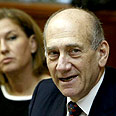
Cabinet marks new school year
Government begins weekly meeting with briefing on new school year's objectives, as PM tells minister education was, is top priority. Opposition Leader Benjamin Netanyahu holds press conference, declares Likud-led government will revolutionize education
Prime Minister Ehud Olmert chose to dedicate Sunday's cabinet meeting to the new school year which, if all goes well, will be officially inducted on Monday morning.
"Israel's safety, security and existence are first and foremost dependent on education," said Olmert. "There is nothing more fashionable these days than saying that our educational system is in shambles, but that is untrue and unfair. Our schools are up to the highest standards.
"This government," he continued, "Has probably devoted more time to education that to anything else; not only when it came to resources – which neared NIS 30 billion (approx. $8.38 billion), but also when in came to instating reforms and building more classrooms, in the Arab sector as well.
"We are proud of the 'New Horizon' initiative, introduced by the education minister (Yuli Tamir). This is much more than just a slogan, this is about a new conception, a new approach and different accents… We must tap into the potential of our educational system in order to reclaim its status. There in nothing anyone can say – this is our main accomplishment," he concluded.
Sunday's cabinet meeting, which was held largely under the banner of the new school year, also saw Education Minister Tamir briefing the ministers on the preparations being made to usher in the new school year. Several other ministers briefed the cabinet on aspects of the preparations, as handled by their respective offices.
'New vision necessary'
Meanwhile, Opposition leader and premiership hopeful Benjamin Netanyahu held a press conference on Sunday, in which he divulged his vision for what he called a "real educational revolution": "The first order of business will be to nix the studies on the Palestinian Nakba Day ('catastrophe' of Israel's inception) and bring back (Ze'ev) Jabotinsky's teachings," he told reporters. "I've been meeting with representatives of the various teachers' associations and they all feel it is time for a change.
"Everyone thinks this change is dependent on budgetary constraints, but I don’t think that is the right approach… we are facing a crisis, but we can get out of it," he continued. "The gaps (in Israeli society are becoming greater, but if there is one thing that can help up reduce them it's a better education system."
The Likud chairman went to detail the grave situation: "In 2002 only a third of (elementary school) pupils passed their reading tests. In the last Mathematics Olympics, even Iran got the better of us. This is a matter of national resilience, of national security. We rank in the top 30 countries now. The real goal is to have Israel's children back in the top 10, within a decade."
Netanyahu then presented his five-step plan: "First, we must have better teachers. We must invest in their training and increase their pay. Second – we have to let the administrators administrate. Every great school system in the world allows its headmasters some independence. We have to make sure headmasters receive management training and give them partial responsibility over the budget.
"The third step will be to redirect our focus to the most important core studies," he continued. "Forth – the world's most successful nations do not allow the weak to fall behind. Every child is different, but you can push everyone to excel on their level; and fifth – teaching educational values. Not just those pertaining to good citizenship, Zionism and democracy, but also discipline and respect which must be shown to teachers and principles.
"Our enemies distribute false propaganda which harms our very right to exist. This false propaganda – the Nakba – has been driven into out education system.
"I am committed to truly revolutionizing the education system and I will make it the first priority the Likud-led government will have," he concluded.
Attila Somfalvi contributed to this report










